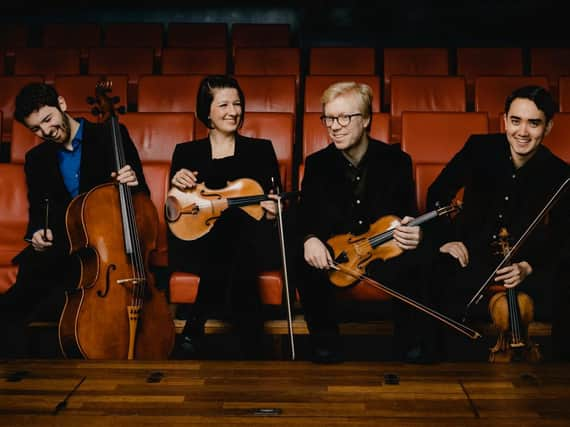Marmen Quartet perform in Brighton - review


Marmen Quartet – Coffee Concert at The Attenborough Centre for the Creative Arts (ACCA), Sussex University, Falmer, (11am).
Johannes Marmen, Ricky Gore (violins), Bryony Gibson-Cornish (viola),Steffan Morris (cello). String Quartets by Haydn (1732-1809), in C Op 74 No 1 (1793); Janacek (1854-1928), No 1 ‘Kreutzer Sonata’ (1923); Beethoven (1770-1827), in C#minor Op 131 (1826).
Advertisement
Hide AdAdvertisement
Hide AdEnlightenment from inside a darkened room. It was given by Johannes Marmen to a large proportion of the Coffee Concerts audience, of whom 205 turned out early on Sunday to hear his young group make their debut in the series.
Such a high figure has not appeared on a previous opening day of a Coffee Concert season at ACCA. We know that this audience likes their string quartets but we can safely doubt that the majority are steeped in Janacek and go around all year whistling his tunes alongside their favourite classical composers Haydn, Mozart, Beethoven or Schubert.
But many of that majority present learned this day at last how to listen to Janacek.
ACCA’s modest-sized concert hall has no outside windows. All light is of human fabrication. The Marmen Quartet took the stage, their female violist in black, with a V-necked evening top and wide trousers; their three men in black suits, patent leather shoes and . . . plain T-shirts. Without a word, they played the masterly first of Haydn’s exciting, London-oriented Opus 74 – very well – and disappeared offstage to short-lived applause.
Advertisement
Hide AdAdvertisement
Hide AdWere the audience taking their Haydn for granted? Were they still half asleep? Or maybe digesting a sartorial shock? Or suddenly apprehensive about Janacek’s first quartet, which was to follow?
The Marmen returned, this time with Johannes remaining on his feet. After a pregnant pause he spoke to the audience. He described the gruesome story behind the quartet’s composition. Beethoven’s tremendous Kreutzer Sonata, for duo, arrested the Russian writer Tolstoy, inspiring his 1889 novella in which a female pianist is murdered by her over-jealous husband on finding she and her friendly male violinist enjoying practicing the Beethoven alone in the home music room. The husband, acquitted, travels on trains asking forgiveness of passengers.
This much Coffee Concerts programme notes writer Chris Darwin has informed those members of the audience who read them. No shocks here, but Janacek’s 1923 outwardly erratic musical language and mood switching is not bathtub listening.
It is here in the concert because most Coffee Concert quartet concerts include one major 20th century piece, often played second, at about 11.30am. The audience welcome this and, if challenged, enjoy the experience, even if they do not emerge as converts to the music. They like their learning.
Advertisement
Hide AdAdvertisement
Hide AdJohannes Marmen had begun by remarking how glad he was it was dark inside ACCA because it felt like an evening concert and disguised the fact that (uncomfortably for most performers) it was 11am. He then gave the audience an utterly priceless piece of advice new to many: “This quartet is like an opera”.
Not everyone knows when listening to Janacek that he composed in the rhythm and pattern of speech, and unhelpfully, of course, in a foreign one. His music is literally speaking to us – about whatever Janacek is thinking, imagining, describing or dramatising. Bereft of this knowledge we struggle to comprehend. Armed with it we become fascinated and engaged.
Immediately in the music to which the Marmen were vividly committed, we heard the mutterings, cries, protests, taunts, laments, screams, shudders, smoulderings, and all the other human fireworks in the work’s literal scenario. And this time the applause was prolonged and heartfelt.
The reward was to listen to late Beethoven in his own declared best string quartet. Seven movements for the price of four, yet each sublimely beyond earthly pricing. I wished the Marmen’s fervour for the scherzo theme had held back the tempo that meant here they rather scrabbled at the theme’s devilish diction, but that’s my only quibble and expecting prematurely from them consummate maturity.
Advertisement
Hide AdAdvertisement
Hide AdEven so, early maturity is strongly present, and if they are a decade younger than, say, the Doric, and another younger than the Castalian, of Coffee Concerts in recent years, here’s a clue why.
The England-based Austrian pianist Alfred Brendel, one of music history’s great performing minds sitting at any instrument, has, at age 87, begun coaching string quartets. It is true and entirely appropriate. Additionally his son Adrian is already an established international ensemble cellist. As a kid he would have had a fantastic practice partner!
The Marmen were one of two quartets Brendel masterclassed early this year. Here in its May edition is how the violinists’ magazine The Strad observed it happening – and how Johannes Marmen afterwards recounted the experience:
Advertisement
Hide AdAdvertisement
Hide AdAfter the Coffee Concert I chatted with violist Bryony Gibson Cornish and can report that: Johannes Marmen is Swedish, not German; Ricky Gore is a half-Japanese Briton; Bryony is a New Zealander from Christchurch and Steffan Morris a Welshman from Neath (do they have rugby in common?).
Plus, it is the quartet’s policy to perform with 1st violin and viola front-stage either side of centre (for enhanced ‘stereo’), and with 2nd fiddle and cello upstage to be more ‘inside’ their sound (unlike, as it happens, the way the Doric and the Castalians lay themselves out);
And, yes, Bryony does the complicated plaiting of her long hair on the top of her head entirely by herself. No, not all violists are reluctant to come forward!
Richard Amey
Marmen Quartet picture by Marco Borggreve: Morris, Gibson-Cornish, Marmen, Gore.
Advertisement
Hide AdAdvertisement
Hide AdNext Coffee Concert – Sunday, November 18 (11am): Jacquin Trio (clarinet, violin/viola, piano). This concert and full Coffee Concert season details: